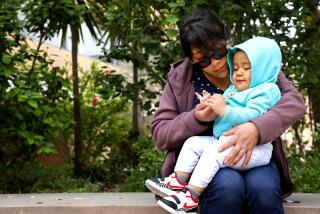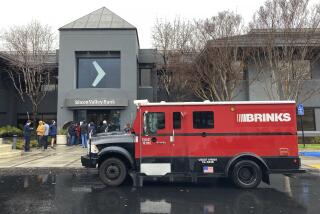Slayings haunt a family business
- Share via
From their perch on a forklift, two men wave their arms and call out to Charlie Bohnhoff as he walks into the lumberyard his family has owned for nearly a century.
Getting his attention, the two workers greet their boss with a military salute. Bohnhoff, returning from a delivery, smiles in fake exasperation and yells: “That’s it. You guys are out of here!”
On the surface at least, Bohnhoff Lumber Co. in Vernon is returning to normal. The floral memorials are gone. The letters and condolence cards have stopped pouring in. The awkward phone calls from customers asking for people no longer there have ceased.
But as Bohnhoff, 79, walks into the office, he passes a reminder: A picture of a middle-aged man, smiling genially, his hands locked behind his head as he leans back in a chair.
Charles “Alan” Bohnhoff. October 29, 1953-May 18, 2009, the inscription reads.
On May 18, gunshots echoed, people ran and bodies fell at the lumber company that Bohnhoff’s grandfather, C.W. Bohnhoff, a German immigrant, founded in 1910. The gunman killed the yard’s foreman, Marine veteran Jaime Sanchez, 31, and Bohnhoff’s son Alan, 55.
The alleged assailant, Saul Moreno, was an employee who seemed to love Charlie Bohnhoff like a father and who, by all accounts, Bohnhoff had treated like a member of the family. Moreno, 51, has pleaded not guilty to two counts of murder and one count of attempted murder.
The elder Bohnhoff tries to keep his mind off what happened that day. Working with his hands, lifting and loading lumber, taking long road trips to make deliveries -- all this helps distract him from gnawing questions: Why here? Were there signs he missed? Could he have prevented it?
Situated amid a warren of factories and warehouses on 26th Street, hard against the Hobart rail yard in Vernon, Bohnhoff Lumber Co. is known for selling lumber from all over the world -- Africa, Asia, South America.
A woodworker’s heaven, it has been called.
Employees are treated like family. Workers who retired long ago often come in to help, or just hang out. Like his father and grandfather, Charlie Bohnhoff helped pay for funerals or lent employees money for emergencies, always trusting them to pay him back when they could.
He called everyone “buddy” and seemed more concerned about their problems than his own.
Employees said they couldn’t remember Charlie or Alan ever yelling at anyone. That wasn’t the Bohnhoff way.
During the Depression, C.W. and his son Clarence Carl Bohnhoff kept the lumberyard afloat without laying anyone off. It has been the same during the current economic downturn, a point of pride for the family.
Charlie went to work for the family business in 1949, between high school and a stint in the Navy. In 1964, the lumberyard was destroyed in a fire. Rival lumberyards pitched in with equipment, lumber and office space.
Many of their owners had gotten their start with the Bohnhoffs and were repaying their kindness.
Like his father, Alan Bohnhoff joined the business straight out of high school, sweeping the yard and driving. He had an even keel and shared with his father a love of the outdoors and hot rods, and an enduring patience.
“Alan never yelled at you. He always kept cool,” said worker Jimmy Contreras, 28. “He treated us with respect. That’s one of the things we loved about him.”
Charlie never worried about what would happen to the business after he died. His son would take over.
Over the years, Bohnhoff Lumber took on a quirky vibe. Dick Bubier, 73, was among a handful of retired lumbermen who spent their time there. One day, as he worked the table saw, he felt something land on his back.
It was a green parrot, famished and thirsty. It became a company pet, just like Elsie, the short-legged Corgi mix that walked in from the industrial neighborhood. And Chief, the black and white cat that Alan had rescued as a kitten.
“Just about everything here is rescued,” Bubier said.
Saul Moreno was a certified lumber grader with more than 30 years’ experience and a knack for quickly measuring pieces of lumber. Charlie Bohnhoff met him at a yard in Orange County and hired him about six years ago.
Moreno could be solemn and distant, but employees said he spoke of the elder Bohnhoff with affection. Bohnhoff would include Moreno in trips to Angels games. When Moreno said he wanted to learn about Christ, Bohnhoff, a devout Lutheran, gave him a King James Bible.
“I treated him very well,” Bohnhoff said. “I think he wished I was his father.”
Moreno’s wife, Dolores, said her husband of more than 30 years had endured a string of heartbreaks. Nine years ago, she said, their 17-year-old daughter died from a brain tumor. More recently, she said, her husband lost his mother in Mexico and a brother-in-law.
On both occasions, Charlie Bohnhoff said, he lent Moreno money for the funerals. He also lent Moreno $1,700 to buy a used Cadillac.
Still, there was friction at work. Though skillful, Moreno was easily angered, co-workers say. He wouldn’t yell, they say. Mostly, he would simmer for hours or leave work.
Humberto “Happy” Gonzalez, 39, said he would intercept customers before they approached Moreno because he worried that Moreno would snap at them.
Employees say Moreno often bristled at taking orders from younger workers and had a particular dislike for Sanchez, who was outgoing and assertive and dreamed of making it big as a singer of Mexican ballads and corridos.
Sanchez sang at clubs and restaurants under the stage name “Chimino” Sanchez. Everyone at work seemed to have a copy of a CD he made. The cover photo showed Sanchez in a 10-gallon hat, holding a glass of tequila as he gazed longingly at a woman’s picture.
Sanchez was raised by a single mother, Maria Rosa Jimenez. She said her son looked up to Charlie Bohnhoff. “The old man was like a father who gave him good advice,” she said. “He loved him. He saw how hard he worked, despite his age, and he was proud to work for him.”
Moreno’s relationship with his boss was more complicated. Bohnhoff said Moreno would sometimes call him at 3 or 4 in the morning to say he had an emergency or had to take his wife to the doctor. Sometimes he would be away from work for weeks, Bohnhoff said.
“When he came back they welcomed him,” Contreras said. “They asked him, ‘How are you doing?’. . . . They didn’t want to lay any of us off.”
A few years ago, the Bohnhoffs hosted a company Christmas dinner at an upscale Orange County restaurant. Moreno showed up, but when a restaurant employee asked him to take off his hat, he stomped off, Gonzalez said.
Alan Bohnhoff’s daughter, Christa Bohnhoff, 29, who works at the lumberyard, said that a month before the shooting, she finally persuaded her father to give Moreno a written warning for missing work.
But when he wasn’t upset, Moreno was one of the yard’s best workers, Charlie Bohnhoff said. And he had a family to support. At Bohnhoff Lumber, that counted for something.
On the morning of May 18, Moreno left his home in Santa Fe Springs as he always did. “He said, ‘Bye, my dear,’ ” his wife recalled.
Gonzalez said Moreno arrived at work earlier than usual. Moreno had just gotten a large order of teak and bragged that Sanchez could never have landed such an order. Gonzalez said Moreno seemed agitated and suggested he might refuse to fill the order.
“Not today,” Moreno said, according to Gonzalez. “Today, I’m a different man, Happy! You don’t know me today!”
Sometime after 9 a.m. Charlie Bohnhoff left the lumberyard briefly and stopped nearby to chat with a motorcycle police officer.
Walt Maas, 51, manager of the yard and a close friend of Alan Bohnhoff, was in the main office about 9:30 a.m. when Moreno walked in. Alan was at his desk.
Maas said Moreno announced that he would not fill the teak order, and a frustrated Alan told him to complete the order or go home for the day.
“I saw the gun come up fast, and he leaned over the desk, and he shot Alan point-blank,” Maas said.
Alan staggered a few steps before collapsing. Employees said Moreno, allegedly carrying a .40-caliber Beretta pistol, followed Alan’s son, Michael, 33, as he backed out a side door. Moreno pointed the gun at Michael’s face and pulled the trigger, employees said, but the weapon did not fire. Moreno, they said, headed into the lumber shed.
Charlie Bohnhoff heard the shots, rushed back and found his son.
He cradled the dying man and told him he loved him, then kissed him goodbye and closed his son’s eyes with the tips of his fingers.
Then he ran into the shed.
“I thought I could keep him from shooting more guys. I wasn’t trying to be a hero, but I think I could have stopped him,” he said.
Bohnhoff found Sanchez lying on the floor. He called for an ambulance, heard the squeal of tires and saw a car speed away. He said it was the Cadillac he had helped Moreno buy.
Dolores Moreno, 49, stood in the hallway of an East Los Angeles courthouse weeks after her husband’s arrest, waiting for him to make an appearance.
When she visited him in jail, he had a request, she said. “He asked for the Bible Charlie gave him. He loved him like his father. . . . He had only beautiful things to say about him.”
She said her husband offered no explanation for the charges against him, and Moreno’s public defender gave no hint of what his defense would be.
L.A. County Deputy Dist. Atty. Islam Ramadan said that because the case involves a double killing, Moreno could face the death penalty.
He declined to discuss a motive for the slayings.
At Bohnhoff Lumber, employees share stories about the co-workers they lost, but the details of what happened that day are usually off-limits.
“We don’t talk about the shooting,” Christa Bohnhoff said. “We talk about my dad and Jaime but not about the shooting.”
Charlie Bohnhoff said he may have been too lenient with Moreno, too understanding. Perhaps, he should have fired him long ago, he said.
“But this was the family way,” Bohnhoff said. “It was the way my grandfather and my dad taught me, and it helped us for almost 100 years.”
--
More to Read
Sign up for Essential California
The most important California stories and recommendations in your inbox every morning.
You may occasionally receive promotional content from the Los Angeles Times.











